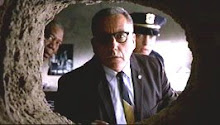
An op-ed I wrote that ran in the Providence Journal-Bulletin on Aug. 15, 2006 to coincide with V-J Day, a state holiday in Rhode Island --
Visiting the Truman Library several years ago, I bought a reprinted copy of the Aug. 15, 1945
Philadelphia Inquirer.
‘PEACE’ read the banner headline over stories of Japan surrendering to end World War II.
It was a story tucked beneath the fold that caught my eye, with this headline -- "U.S. Cruiser Sunk With Every Man Lost or Wounded."
Many veterans of World War II know the name of the ship, as will students of history. It was the
USS Indianapolis.
Others are familiar with the
Indianapolis from the movie "Jaws." The shark hunter Quint, played by Robert Shaw, describes the sinking of the
Indianapolis during a night of drunken reverie with Amity Police Chief Martin Brody
and oceanographer Matt Hooper.
"
So, 1,100 men went into the water, 316 men come out, the sharks took the rest, June the 29th, 1945," Quint said, lost in the horror of his memories. "
Anyway, we delivered the bomb" -- a reference to the atom bomb dropped on Hiroshima.
It turns the movie got the date wrong -- the
Indianapolis was torpedoed by a Japanese submarine on the night of July 29 and sank in 12 minutes. Its loss came so close to the end of the war that it was not reported to the public, as by the
Inquirer, until Aug. 15 -- the day after Japan surrendered.
The sinking of the
Indianapolis is significant in another respect: it remains the worst loss of life for a US Navy vessel at sea --
ever.
Only one other American warship suffered heavier losses -- the battleship
Arizona in Pearl Harbor, just after the start of the surprise attack by Japan in December 1941 which brought the U.S. into World War II. Most of the 1,102 men killed on the
Arizona died in an instant when a bomb exploded in the ship's forward magazine.
In other words, the two worst losses in the history of the Navy came only minutes after America abruptly become a combatant in World War II -- and just weeks before the war ended. And the sinking of the
Indianapolis is a prime example of just how dangerous Japan remained to the end of the war.
Revisionists claim that President Harry Truman's
decision to use the atom bomb makes him no better than Islamist suicide bombers of today. Only an ethos long seeped in moral relativism could believe such an absurd proposition.
Far from inflaming conflict in the manner of jihadists, Truman's decision led to an abrupt end to conflict -- and the bloodiest war in history at that. Emperor Hirohito announced on Aug. 14 that Japan would surrender -- less than a week after Nagasaki was attacked. The second bombing, often criticized as gratuitous, showed that the destruction of Hiroshima three days earlier was not a fluke.
Truman's critics cite the horrifying death tolls in Hiroshima and Nagasaki, where casualties ran in the hundreds of thousands, and point out -- accurately -- that most of those killed were civilians.
But what these critics rarely acknowledge is how many civilians were killed as the result of the brutal, ongoing Japanese occupation of China, Korea, Manchuria, Taiwan, southeast Asia, Malaysia, Burma (now Myanmar) and the Dutch East Indies, known to us today as Indonesia.
Historian Robert Newman
and others have calculated that 250,000 to 400,000 people, overwhelmingly noncombatants, were dying every month as a result of Japanese barbarity.
Revisionists also claim that Japan was ready to surrender before the atom bomb. An examination of the pattern of conflict in the Pacific leads to the opposite conclusion.
Japan was a formidable opponent from the start of the war, but never fought with more ferocity than at Saipan in the summer of 1944. Until, that is, February 1945 on Iwo Jima, when the carnage was even worse. Until that spring at Okinawa, when more than 200,000 people, combatants and civilians, were killed, wounded or never heard from again.
The pattern was clear -- the closer the Allies came to Japan, the greater the losses on both sides.
As with Islamists we fight today, the Japanese resorted to suicide bombers -- kamikaze pilots. In both cases, the fanaticism of our foes in no way validates their perverse beliefs.
While we can only wonder what might have been had Truman not used the bomb, what occurred after he did is indisputable -- the unconditional surrender of Japan in a matter of days.
Truman rarely gets credit for another aspect of his decision worth noting: atomic weapons have not been used in war since 1945. Why no other leader has pulled the nuclear trigger is fair game for speculation, but I count myself among those who believe that Hiroshima and Nagasaki demonstrated the fearsome power of these weapons, which have only grown in number and intensity. A nuclear conflict today would make the loss of two cities pale by comparison.
The decisive manner that Truman ended the war had another positive effect -- it purged Japan of the militarism which held sway in the country for more than a decade, and provided the foundation for the modern, industrious Japan we now consider an important and respected ally.
A Japan that few fear will attack them out of the blue on a quiet Sunday morning.
 Caller on Ed Schultz's radio show today who identified himself as "Raymond," chairman of town Democratic committee in Dartmouth, Mass., describing his approach to moderating town hall forum on health reform Aug. 18 attended by Bay State congressman Barney Frank --
Caller on Ed Schultz's radio show today who identified himself as "Raymond," chairman of town Democratic committee in Dartmouth, Mass., describing his approach to moderating town hall forum on health reform Aug. 18 attended by Bay State congressman Barney Frank --




